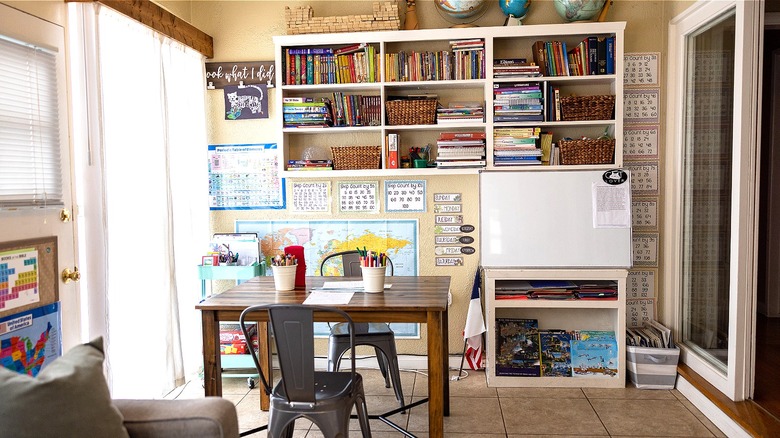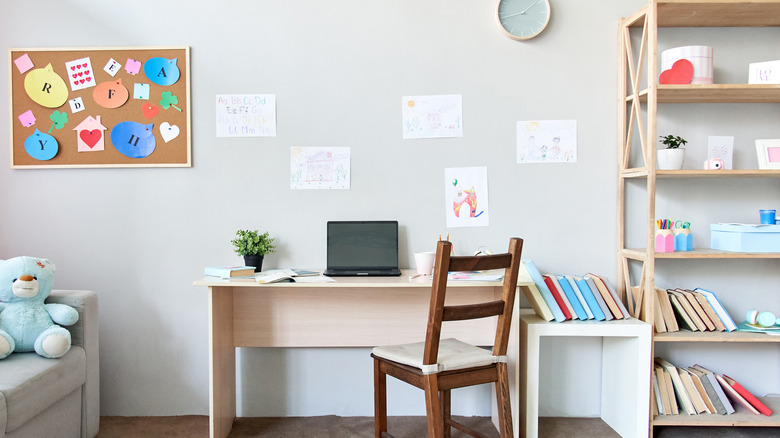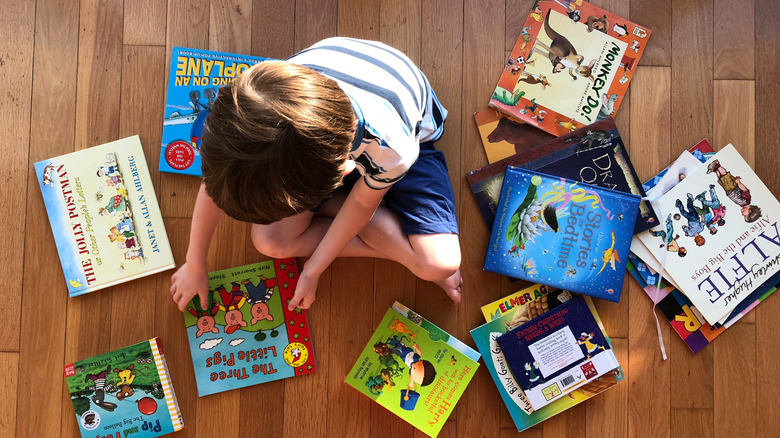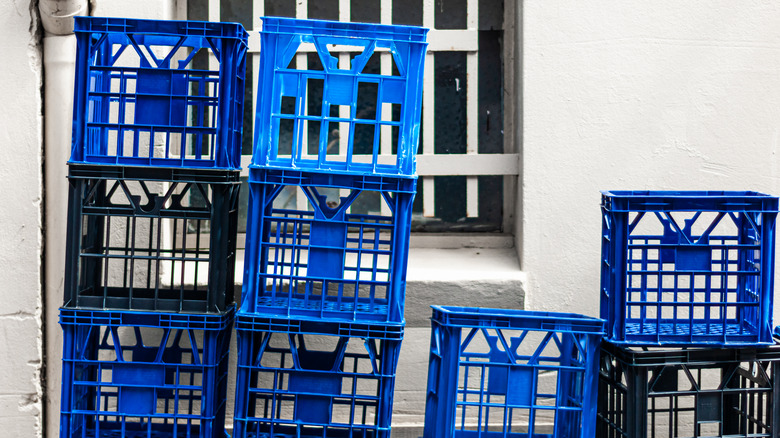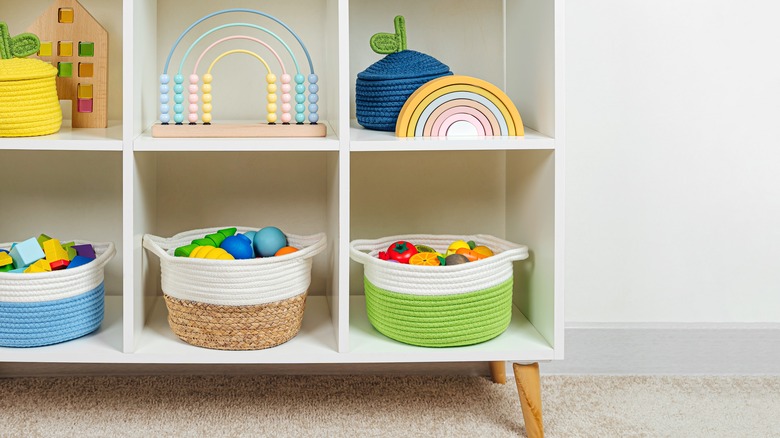How To Create A Homeschool Classroom On A Budget
We may receive a commission on purchases made from links.
According to a survey conducted by My eLearning World, teachers spent an average of $820 on classroom supplies for the 2022-23 school year. Homeschool classes, meanwhile, typically have fewer students and therefore require fewer supplies. However, homeschools also need furniture like student desks and other resources that are freely available in a public or private school setting. Designing a space and stocking it can get expensive fast, but with the right tips in mind, you can create a homeschool classroom on a budget.
When approaching a new homeschool space, it's easy to become overwhelmed by the number of things you need to purchase. A large school may have storerooms of equipment, a library, and a flowing stream of notebook paper. Homeschool teachers, though, have to not only compile a pool of resources but they need to create the space as well. Luckily, teachers have a knack for finding cost-effective hacks and freebies, and you can apply many of these tricks to your own homeschool classroom.
Design a layout with daily activities in mind
Homeschool classrooms are limited in size, but you can still create a functional and attractive layout. Consider what your student(s) will do on a typical day. Ideally, they move around and transition physically while switching to a new lesson or task. Imagine how that movement could look. Your student may benefit from a ping-pong movement where they alternate sides. Or, a student might feel calmer from going clockwise around the room. Think about what would work best for your student.
An ideal layout includes room for activities like hands-on learning, a comfortable spot to read, as well as writing stations that can double as digital learning centers. A spot for exercise is also beneficial if you've got the space. Creating a purposeful and effective floor plan is a free way to elevate the classroom. It's also a good way to distinguish this room from any other room in the house.
Shop for used books and look for teacher-only sales
A varied library is vital in a classroom. Students need books they enjoy, books they can easily read, and books that challenge them. Used bookstores offer a quick and affordable way to stock a library. Buying second-hand is a great way to find old favorites and books that may no longer be in mass production. Sites like eBay may feature bundles with multiple titles and even classroom library packs.
For new books and more recent titles, you must become The Deal Watcher. Booksellers like Barnes & Noble offer 20% off to educators year-round but bump that savings up to 25% on Educator Appreciation Days. Popular publisher Scholastic features an online warehouse sale to replace its previous in-person sales. In addition to keeping your eyes peeled for sales, you should take advantage of discount retailers like Half-Price Books and First Book, which specializes in children's books.
Transform inexpensive (or free) milk crates into shelving
Milk crates are magical and, depending on who you ask, free. With a few milk crates, zip ties, and paint, you can DIY a shelving unit like the popular cube units. Simply stack the boxes together in a configuration that suits your needs (i.e., 3 x 3). Use the zip ties to hold the crates together and paint them. Your homeschool classroom shelving unit will be sturdy enough to support books, supply bins, and more.
Sourcing the crates is easy. Grocery and convenience stores receive hundreds of milk crates with their stock. Sometimes it's as simple as asking the manager for any crates they intend to discard. Mentioning that you're an educator is always a good way to seal the deal. Should that method be unfruitful, you can look on Freecycle, a community-based website, to find free goods. In the event that you can't source them for free, milk crates are relatively inexpensive to purchase.
Use dollar store baskets for accessible storage
Any educator knows the importance of an organizational system and how quickly the classroom can spiral without it. Discount stores like Dollar Tree sell a variety of colorful baskets in many shapes and styles — and all at budget-friendly prices. Small baskets will be suitable for writing utensils, school supplies, and other easy-to-lose items. They work well as desk and drawer organizers, too. Larger baskets can hold books, learning tools, sensory objects, and anything else that might contribute to clutter.
The contents of baskets are easy to identify, and the handles make them a breeze to carry. You can put frequently used items in baskets to make them quick and easy to grab when needed. Using this kind of storage for your homeschool classroom is great for kids as it's accessible and accessibility nurtures independence. Consider creating baskets for center activities to have smooth transitions. A basket for each station makes setting up and cleaning up faster, thus saving valuable hands-on learning time.
Decorate with student-made anchor charts and learning aids
While every educator would love to fill their homeschool classroom with the finest premade decorations, the reality is that most flashier decorations are costly. Though curated décor can enhance learning, veteran teachers will tell you that the best collection is built over time. So when you're looking at blank walls, consider decorating with anchor charts and student creations. Anchor charts are visual tools that are created and updated as a concept is taught. They're perfect for combining decoration and education. Anchor charts can be referred to throughout the year, and they can get pretty colorful.
Similarly to anchor charts, student work can be attractive and inspire a sense of pride. Chances are your student(s) will create something visual as a part of a lesson. Display this work as you would any décor. Student crafts or drawings will also give the room a charm that mass-produced decorations cannot. Your student likes to create, and who doesn't love a drawing of a blue horse underneath a purple sun?
